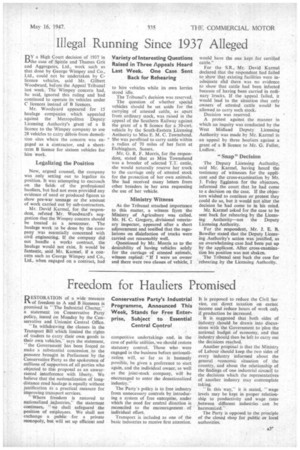Freedom for Hauliers Promised
Page 49

If you've noticed an error in this article please click here to report it so we can fix it.
Conservative Party's Industrial Programme, Announced This Week, Stands for Free Enterprise, Subject to Essential Central Control
D ETORATION of a wide measure
of freedom to A and B licensees is promised in "The Industrial Charter," a statement on Conservative Party policy, issued on Monday by the Conservative and Unionist Central Office.
" In withdrawing the clauses in the Transport Bill which limited the rights of traders to carry their own goods in their own vehicles," says the statement, " the Government has been forced to make a substantial concession to the pressure brought in Parliament by the Conservative Party as the spokesmen of millions of supporters of all parties who objected to this proposal as an unwarranted interference with liberty. We believe that the nationalization of longdistance road haulage is equally without justification as a practical measure for improving transport services.
"Where freedom is restored to nationalized industries," the statement continues, " vie shall safeguard the position of employees. We shall not exchange a public for a private monopoly, but will set up efficient and
competitive undertakings and, in the case of public utilities, we should restore statutory control. Those who were engaged in the business before nationalization will, so far as is humanly possible, be given a preference to start again, and the individual owner, as well as the joint-stock company, will be encouraged to enter the denationalized industry."
The Party's policy is to free industry from unnecessary controls by introducing a system of free enterprise, under which the need for central direction is reconciled to the encouragement of individual effort.
Transport is included as one of the basic industries to receive first attention.
It is proposed to reduce the Civil Service, cut direct taxation on earnec income and reduce hours of work only if production be increased.
It is suggested that both sides of industry should be drawn into discussions with the Government to plan the national budget of economy, and that industry should then be left to carry out the decisions reached.
Another proposal is that the Ministry of Labour should keep the two sides of every industry informed about the general economic situation of the country, and about the relationship of the findings of one industrial council to the decisions which the representatives of another industry may contemplate taking.
" In this way," it is stated, " wage levels may be kept in proper relationship to productivity and wage rates ,between different industries can be harmonized."
The Party is opposed to the principle of the closed shop for public or local authorities.












































































